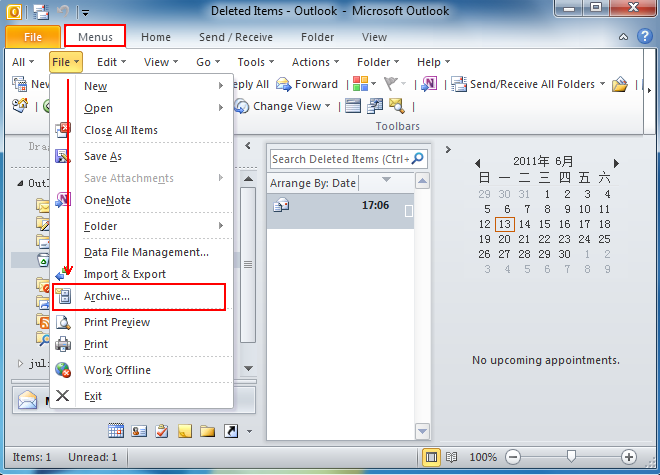

- #Export and archive folder in outlook 2016 how to
- #Export and archive folder in outlook 2016 windows
Click OK at the "Message Delivery Location" information message.ĩ. Highlight the "Personal Folders" and click Set as Default.ĩ. Rename "Archive Folders" to " Personal Folders" and click OK.Ĩ. Rename "Personal Folders" to " Personal Folders OLD" and click OK.Ħ.
#Export and archive folder in outlook 2016 windows
Navigate to Windows Control Panel and set the View By: to Small icons.ĥ.

Set the NEW PST file as the Default Store Location for Outlook.ġ. Close Outlook and proceed to the next step. "OutlookNew.pst in this example) and the "Personal Folders" is the old (existing) PST file (e.g. * The "Archive Folders" is the newly created PST file (e.g. When the archive process is completed you should see under the "Archive Folders" group, the same list of the folders that you already have under the "Personal Folders" group. Click OK again to start the archive process.ħ. * Note: At the end of the process, this file will be the default store location for Outlook.Ħ. Type a recognizable name for the new Outlook data file (e.g. Specify a date far back to the past to make sure that no mails are moved to the new PST file. Choose to Archive this folder and all subfolders.ģ. At Archive options, apply the following settings:ġ. Outlook 2016: File-> Info -> Tools -> Clean Up Old ItemsĢ.Outlook 2010 & Outlook 2013: File -> Info –> Cleanup Tools -> Archive….To copy the existing folder structure from the current Outlook PST file to a new (empty) Outlook data file, you have to create the new Outlook PST file using the "Archive" feature in Outlook. Create the New Outlook PST file by using the Archive command.
#Export and archive folder in outlook 2016 how to
How to Transfer the Outlook Folder Structure to a new Outlook Data File. At the end of the process, you will be able to use the new Outlook data file, as the default store location, for your emails, calendar and contacts. In this tutorial I'll show you how to copy the Outlook folder structure only (without the emails) to a new -empty- Outlook PST data file. This is useful especially if the current Outlook file is too big in size and you face problems when working or managing it and you want to create a new PST file with the existing (current) folder structure. Sometimes when working with Outlook, there is the need to create a new (empty) Outlook PST Data file but to keep the current Outlook folder structure from the old Outlook PST data file.


 0 kommentar(er)
0 kommentar(er)
